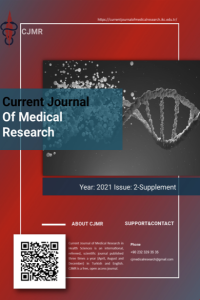Abstract
Purpose:It is thought that the prevalence of anxiety in medical school students is higher than in the general population. In our research, we aim to question whether the stress levels of the medical students are different compared to other faculty students and how they deal with stress.
Material and Methods:This cross-sectional study was conducted online at Izmir Katip Çelebi University between 10 Febru-ary 2021 and 4 April 2021. The data were collected from 521 students, including 346 students from medical schools and 175 students from other faculties (2 of the questionnaires were considered out of the universe and not included in the study). In this study we used a 7-question sociodemographic questionnaire; depression, anxiety and stress (DASS-21) and ways of coping with stress scale.
Results and Conclusions: We found that students in other faculties scored higher for all emotional conditions than medical students. Students with a monthly income below the poverty line had higher scores of anxiety and depression. Although there was no significant correlation between levels of socialising and levels of stress, students who socialized less had higher anxiety and depression scores. Stress scores were found to be higher at the age of 20 and under. Women were found to score more for all their moods. Those who were not satisfied with the academic achievement status were found to score higher for three moods. In substance use, it was seen that those who used 1 and 2 substances scored higher, while those who used 3 substances did not find any significant difference. No relationship was found between the methods of coping with stress and the faculty being read.
Keywords
Abstract
Amaç: Tıp fakültesi öğrencilerinde anksiyete yaygınlığının genel topluma göre daha fazla olduğu düşünülmektedir. Biz de araştırmamızda Tıp Fakültesi öğrencilerinin diğer fakülte öğrencilerine göre stres düzeylerinin farklı olup olmadığını ve stresle baş etme yöntemlerini sorgulamayı amaçlıyoruz.
Materyal ve Metot: Bu kesitsel çalışma 10 Şubat 2021-4 Nisan 2021 tarihleri arasında İzmir Katip Çelebi Üniversitesinde online yapılmıştır. Veriler rastgele seçilen 346’sı tıp fakültesi, 175’u başka fakültelerin öğrencisi olmak üzere 521 öğrenciden (anketlerden 2 tanesi evren dışı kabul edilerek çalışmaya dahil edilmemiştir) alınmıştır. Çalışmada 7 soruluk sosyodemografikanket; depresyon, anksiyete ve stres ölçeği (DASS-21) ve stresle başa çıkma yolları ölçeği kullanılmıştır.
Bulgular ve Sonuç: Çalışmamızda tüm duygudurumları için diğer fakültedeki öğrencilerin tıp öğrencilerine göre daha fazla puan aldıkları ortaya konuldu. Aylık geliri açlık sınırının altında olan öğrencilerin anksiyete ve depresyon puanları daha fazlabulundu. Sosyallik seviyesi ile stres durumu arasında anlamlı ilişki bulunamasa da düşük sosyallik seviyesindeki öğrencilerinanksiyete ve depresyon puanları yüksek bulundu. 20 yaş ve altında stres puanları daha yüksek bulundu. Kadınların tüm duygudurumları için daha fazla puan aldıkları görüldü. Akademik başarı durumundan memnun olmayanların üç duygudurumu için daha yüksek puan aldığı görüldü. Madde kullanımında ise 1 ve 2 madde kullananların daha yüksek puan aldığı görülürken 3 madde kullananlarda anlamlı bir fark bulunamadı. Stresle başa çıkma yöntemleri ile okunulan fakülte arasında bir ilişki bulunamadı
Details
| Primary Language | Turkish |
|---|---|
| Subjects | Clinical Sciences |
| Journal Section | Conference Paper |
| Authors | |
| Publication Date | December 7, 2021 |
| Submission Date | September 11, 2021 |
| Published in Issue | Year 2021 Volume: 1 Issue: 2-Supplement |


